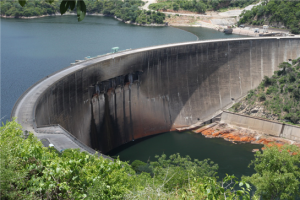
Zimbabwe and neighbouring Zambia heavily rely on hydro-electric power from Kariba Dam, but residents within walking distance from the dam are singing the blues
While some Zimbabweans are expressing shock at the government’s failure to implement the Constitution given the huge resources and energy spent on the constitution writing exercise, in Siakobvu they are least surprised. “Maybe just a little disappointed,” says a local traditional leader. “Of course, the whole pomp and fanfare (surrounding the Constitution making exercise) gave us a spark of hope but, alas, it is the same old story.”Displaced from Zambezi Valley during the colonial era in the 1950s to pave way for the construction of Lake Kariba, people here have lived with this kind of neglect for decades. This is despite living close to a water body which not only provides for the country’s electricity needs, but is a hub of economic activity which the locals are effectively shut from.generated from Kariba Dam, but we were never considered,” says Jim Nesbert Kayi, the headman of Dhundwe village about 500km north-west of Harare. “When we were displaced to make way for the dam, we were promised many things, but it seems these remain promises.” The promises range from a decent life pegged on irrigation projects and roads to attract tourists to the Bumi Hills to electricity and better economic opportunities. But more than 30 years after independence, very little has changed.
The new Constitution has failed to provide relief. The dilapidated main road to Chief Mola’s area from Karoi is so bad that only those drivers with all terrain vehicles can access it, thus cutting the community from key centres.The bad roads feed into the health care problems facing people in this impoverished area. “At times we go to Mola Health Centre and there are no drugs. We are told they have not been delivered from Karoi because of the bad roads. We are suffering here,” says Esnath Mabhechu from Dove Village.“We feel we are a forgotten lot. Just look at the roads. They are bumpy and completely washed away in some areas. We have no public transport because of that,” she says.Champion Rare, the current Chief Mola, says he has made several for people in his area without any success. “This giant Zambezi River is there for us to just stare at. We do not us,” he says. “Safe drinking water is a problem. I have been to Harare several times but nothing has materialised.
I feel like a fool at times as people here might think I do not care for them.”Siyamavu village headman Patrick Siyambale says the poverty ravaging the area is down to government neglect.yet we have no other means of earning a living in this dry area. The government should ensure we have water from Zambezi River drawn to this area for us to embark on agriculture projects to survive,” says the village leader.People under Chief Mola say since 1980, politicians promise to address their concerns ahead of elections. the headman for Mazabuko Village. “We have repeatedly been assured of boreholes and piped water from Kariba dam. The assurances have not come to fruition. We remind the politicians of our problems all the time, but nothing has been solved,” chips in George Rare, a son to Chief Mola. People here are not convinced by the explanation from government that it is too broke to provide constitutionally guaranteed services. And one can hardly blame them, given the top of the range vehicles connected, whose opulence in the midst of poverty has left a sour taste in the mouth here.


